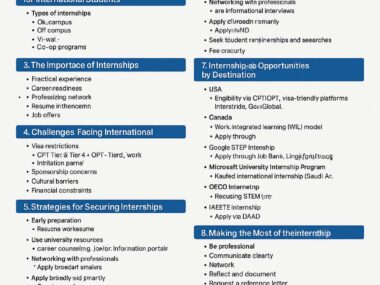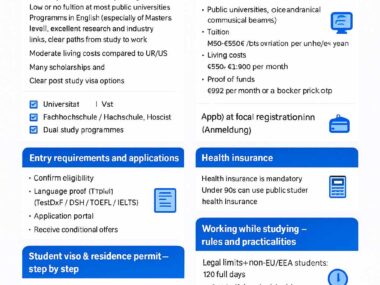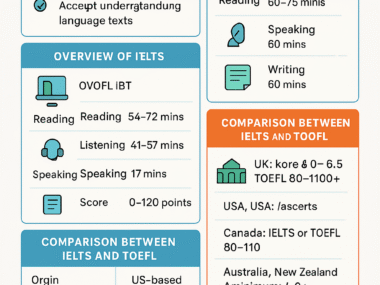CAN I WORK WHILE STUDYING IN FRANCE, ITALY, AND IRELAND?

Studying abroad offers a unique opportunity to acquire a world-class education while immersing oneself in a new culture. For many international students, balancing studies with part-time work is essential—not just for financial sustainability but also for gaining experience, building networks, and enhancing employability. Among the top destinations in Europe, France, Italy, and Ireland are renowned for their quality education, vibrant student cultures, and opportunities for work during studies.
This comprehensive guide explores the rules, regulations, and practical realities of working while studying in France, Italy, and Ireland, focusing on visa policies, types of jobs available, income expectations, and how students can successfully manage both work and academic responsibilities.
WORKING WHILE STUDYING IN FRANCE
Legal Framework and Student Visa
International students from outside the European Economic Area (EEA) or Switzerland must obtain a long-stay student visa (VLS-TS) to study in France. This visa automatically grants the holder the right to work part-time.
Work Limits and Conditions
- Legal limit: International students are allowed to work 964 hours per year, which translates to approximately 20 hours per week during the academic year and full-time during holidays.
- Minimum wage: Students earn at least the SMIC (French minimum wage), which is about €11.65/hour gross (2025 rates may vary slightly).
- Students are not required to obtain a separate work permit.
- Work hours must not interfere with academic commitments.
Types of Student Jobs
- On-Campus Jobs:
- Library assistants
- Campus tours
- IT support
- Language tutoring
- Off-Campus Jobs:
- Hospitality (cafés, restaurants, hotels)
- Retail (cashiers, store assistants)
- Babysitting or tutoring
- Internships (sometimes paid)
Internships and Work Placements
In France, internships are a core part of many degree programs:
- Must be formally defined in a “convention de stage.”
- Paid if longer than 2 months, with a minimum stipend of €4.35 per hour.
- Do not count toward the 964-hour annual work limit.
Post-Study Opportunities
- Students with a master’s degree or equivalent can apply for a temporary residence permit (APS) for up to 12 months (renewable once) to seek employment or start a business.
- Graduates who secure a job with a salary of 1.5 times the minimum wage can apply for a residence permit as a worker.
WORKING WHILE STUDYING IN ITALY
Student Visa and Work Permissions
International students from non-EU/EEA countries must apply for a national visa (type D) for studies. This visa allows for limited part-time employment.
Work Limits and Conditions
- Students can work up to 20 hours per week during term time and full-time during vacations, not exceeding 1,040 hours per year.
- No additional work permit is needed if the employer handles the contract and paperwork correctly.
- The employer must submit a “declaration of employment” to the immigration office.
Minimum Wage and Earnings
- Italy does not have a national minimum wage law; wages are determined by collective agreements.
- Average student wages range between €7 to €10 per hour depending on location and type of work.
Types of Student Jobs
- On-Campus:
- Research assistants
- Library aides
- Student help desks
- Off-Campus:
- Cafés, pizzerias, and gelato shops
- Retail stores
- English language tutoring or babysitting
- Freelancing (for students in tech, design, or media)
Internships
- Internships (called “tirocini”) are often part of academic programs.
- Can be paid or unpaid; universities often assist in placement.
- Does not count towards the annual work hour limit if it is part of your course.
Post-Study Options
- Students can apply to convert their study permit into a work permit after graduation if they find suitable employment.
- Some students apply for the “job search visa”, valid for 6–12 months, to look for employment or set up a startup.
- Once employed, you can switch to a residence permit for salaried employment (permesso di soggiorno per lavoro subordinato).
WORKING WHILE STUDYING IN IRELAND
Student Visa and Work Entitlements
Ireland is a top destination for English-speaking international students. Students from outside the EU/EEA must apply for a student visa (Stamp 2) to study in Ireland.
Work Limits and Conditions
- Students can work 20 hours per week during the academic term.
- During holidays (June, July, August, and December 15 to January 15), students can work up to 40 hours per week.
- Students must be enrolled in a course on the Interim List of Eligible Programmes (ILEP).
- The course must be full-time and of at least one academic year (minimum NFQ Level 5).
Minimum Wage and Income
- Ireland has a national minimum wage, which is €12.70 per hour (2025 rates may vary).
- Students under 20 years old may earn slightly less, based on age and experience.
Types of Student Jobs
- On-Campus:
- University services (IT, library, student offices)
- Event assistance
- Off-Campus:
- Food and beverage industry (pubs, cafés, restaurants)
- Retail (bookshops, clothing stores)
- Customer service call centers
- Freelancing or gig work
Internships
- Paid internships are widely available, especially for IT, business, and healthcare students.
- Often coordinated through the university or arranged independently.
- Some programs require a work placement as part of graduation criteria.
Post-Study Work Options
Ireland has a favorable policy for post-study employment:
- Students who complete Level 8 degrees (bachelor’s honors) are eligible for a 1-year stay-back visa.
- Those who complete Level 9 (Master’s) can apply for a 2-year stay-back visa under the Third Level Graduate Scheme.
- Allows time to find employment and apply for a general or critical skills work permit.
COMPARING FRANCE, ITALY, AND IRELAND
| Feature | France | Italy | Ireland |
|---|---|---|---|
| Weekly Work Limit | 20 hours | 20 hours | 20 hours (40 during holidays) |
| Hourly Pay (avg.) | €11.65 | €7–10 | €12.70 |
| Internship Policy | Strong, paid if >2 months | Common, some unpaid | Integral, usually paid |
| Work Permit Needed? | No | No (employer declares) | No |
| Post-Study Options | 12 months (APS), renewable | Up to 12 months job-seeking visa | 1–2 years (Graduate Scheme) |
| Popular Jobs | Cafés, babysitting, on-campus | Hospitality, tutoring, freelance | Retail, hospitality, call centers |
TIPS FOR WORKING FOR WHILE STUDYING ABROAD
1. Time Management is Key
Balancing work and study can be challenging. Students should prioritize academics and ensure their work schedule doesn’t interfere with classes or exam preparation.
2. Learn the Language (France & Italy)
While many jobs are available in English, learning French or Italian opens doors to more local opportunities, especially in customer service roles.
3. Use University Career Services
Most universities in Europe have dedicated career centers that help students find jobs, prepare resumes (CVs), and practice for interviews.
4. Respect Work Limits
Exceeding the legal work limits can lead to fines, deportation, or problems renewing visas. Always stick to the allowed hours.
5. Save and Budget Wisely
Although student jobs provide income, they often won’t cover all living expenses. Plan your budget and avoid relying entirely on part-time work for tuition or rent.
REAL-LIFE EXPERIENCES
Marie from Cameroon – Studying in France
Marie studies biotechnology at Université de Montpellier. She works 15 hours a week at a bookstore and tutors high school students in biology.
“Working helps me integrate better into French society. I’ve improved my French and made local friends.”
Ali from Pakistan – Studying in Italy
Ali is pursuing a master’s degree in architecture in Rome.
“I work part-time at a design studio. It’s unpaid, but the experience is invaluable. I plan to start paid freelance work soon.”
Precious from Nigeria – Studying in Ireland
Precious is enrolled in a business analytics program at Trinity College Dublin.
“My part-time job at a retail store pays €13/hour. It helps with bills, but I make sure it never interferes with my coursework.”
CONCLUSION
Yes, you can work while studying in France, Italy, and Ireland—and doing so offers valuable financial, professional, and personal benefits. Each country has its own rules and limitations, but they all recognize the importance of allowing students to work and integrate into the local economy and culture.
International students are encouraged to fully explore these opportunities while staying within legal limits, focusing on their studies, and preparing for long-term success—whether that’s securing a full-time job after graduation, returning home with international experience, or continuing their studies.
Working while studying abroad is not just about money—it’s a chance to grow, contribute, and succeed in a global society.




